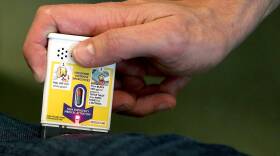Some residents of northeast Wilmington received kits with the opioid overdose reversing drug naloxone Tuesday.
Lt. Gov. Bethany Hall Long, St. Francis emergency room doctor Sandra Gibney and staff from Brandywine Counselling do the runs periodically. They walk down sidewalks and talk to people on porches, in front of stores, and sometimes sleeping on sidewalks. They hand out zipper pouches with doses of nasal spray naloxone, which can save people overdosing on opioids.
Some residents are apprehensive. But Shawn McNeil, who lives near N. Market St., was glad to get a kit.
“I actually witnessed somebody overdose, and the ambulance took too long,” he said. “Unfortunately, they’re not here today. So if someone would go out, or overdose, instead of calling 911, it’s already here.”
McNeil says he’s noticed more people using since the start of the pandemic. He attributes this to increased stress, and more unemployment
“Stress plays on the mind,” he said. “It might send you to make you think that, I’m not working, so I’ve got to do something. And it leads to other stuff.”

St. Francis Hospital’s Dr. Sandra Gibney says she has noticed an increase in overdose patients in her emergency room since the pandemic started. So she, Brandywine Counselling staff and Hall Long started their outreach again.
“We were out in full force before COVID and we kind of slithered back a little, because people were worried, they weren’t out, they weren’t on the street,” said Gibney. “But we’re back in full force now. We’re still wearing our mask, we’re still being protective when we need to. But we cannot wait. People are dying.”
Holly Rybinski of Brandywine Counselling says the team can distribute up to 150 naloxone kits on a given run.
Gibney admits handing out the naloxone is just a short-term solution. The long-term goal is to get people into treatment, when they’re ready.
“People have to come in in their time,” said Gibney. “But we’re going to give them every opportunity to have the resources.”
Gibney notes the kits she helped hand out contained Help is Here Delaware flyers with information on where to seek treatment.
Wilmington City Councilwoman Zanthia Oliver and Council President Hanifa Shabazz joined the outreach team Tuesday.
Oliver says there’s a need for more in-patient addiction treatment centers in the city.
“It’s something that we have to advocate for on all levels of government,” said Shabazz, who is running for a second term as Council president. “This work that we’re doing here, giving out the Narcan, is just one step that we can do to save some lives until we can get them the services that they need.”
Lt. Gov. Bethany Hall Long is hopeful that the pandemic is helping people think differently about mental health.
“A lot of people are embarrassed, but they shouldn’t be,” she said. “It’s no different than having diabetes, or heart disease, or cancer. If you suffer, you don’t have to suffer alone. And so I’m seeing an increase with COVID where people are recognizing this.”
As of last month, the overdose death rate during the pandemic remained comparable to recent years. But Delaware recorded the most suspected drug overdose deaths it has ever seen in a single month this past May.
Struggling with addiction? Call Delaware’s 24/7 hotline 833-9-HOPEDE.








